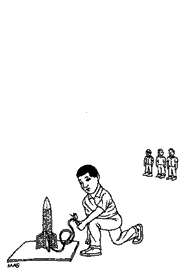
Movies
October Sky (Universal Pictures). Critics' reactions cover the spectrum. The story, based on Homer Hickam Jr.'s memoir Rocket Boys, follows a few backwoods kids in the 1950s who use amateur rocketry as a steppingstone to college scholarships and an escape from the coal mines where their fathers work. Those who praise the film say it's "one of the most unfashionable movies of the new year, and one of the most appealing. Made with a gee-whiz earnestness and simplicity that's so out of style it's refreshing" (Kenneth Turan, the Los Angeles Times). Others are more wary of the movie's syrupy core: David Denby says the film is "borderline corny, but I was held by it; I was even moved by it" (The New Yorker), and David Edelstein in Slate calls it "agreeably guileless for such a manipulative genre." The most critical reviewers call it predictable: "[T]he visuals, the dialogue, the sentiments, all seem lifted right out of the Boy Scout Handbook" (Peter Rainer, New York). (Visit Hickam's high school's Web page to see the hometown reaction to the film.)
Jawbreaker (TriStar Pictures). "Feeble" and "inadequate even by lazy-pastiche standards" is how Dennis Lim of the Village Voice describes this mean teen movie about a posse of cruel popular girls who accidentally kill one of their own and try to cover it up. Although it pitches itself as an hommage to films such as Heathers, Carrie, and Clueless, critics say writer-director Darren Stein "can't decide whether he's satirizing his demon heroines' homicidal indifference or celebrating it" (Owen Gleiberman, Entertainment Weekly). The film has only two things worth looking at: the eye-popping costumes and Rose McGowan, who has the part of the bitch-goddess down pat. (Read this article on McGowan, fiancee of Marilyn Manson, in Entertainment Weekly.)
Office Space (20th Century Fox). Good reviews for the first nonanimated feature film written and directed by Mike Judge, creator of Beavis and Butt-head and King of the Hill. "Bristling with shrewd observation, inspired humor and all-around smarts," says Kevin Thomas of the Los Angeles Times. The subject is the soul-crushing monotony of life in a corporate cubicle, and how a few drones manage to shake things up. The only negative reviews come from two critics who write for big papers--Stephen Holden of the New York Times and Susan Wloszczyna of USA Today--which makes you wonder if they've got so successful they've forgotten the torture a jammed copy machine can inflict on the lowly. (The official site has a variety of screensavers you can download to brighten up your own cubicle.)
Music
The Hot Rock, by Sleater-Kinney (Kill Rock Stars). The fourth album from the hard-rocking female punk rock trio from Olympia, Wash., gets great press: "[T]his cerebral album ... is a striking countermelody to the junk that now passes as Top-40 rock" (Christopher John Farley, Time). After years on the indie scene, the band is now receiving praise everywhere from Rolling Stone to Entertainment Weekly, whose Will Hermes asks, "Is Sleater-Kinney the greatest rock & roll band in America?" and gives the album an A. The only sour note comes from the Los Angeles Times' Richard Cromelin, who finds some of the songs cold, tight, and remote. (Listen to samples from their latest album courtesy of Rolling Stone.)

Books
Traveling Mercies: Some Thoughts on Faith, by Anne Lamott (Pantheon Books). Cathy Lynn Grossman sums up the responses to Lamott's collection of essays on faith: "Either you recognize your own personal truths in Lamott's highly personal epiphanies ... [o]r she makes you spit, sputter, and slam things. You don't find it remotely enlightening to share relentless intimacy with someone so angry, self-righteous and strange--and so proud of being candid" (USA Today). Most critics call the collection "funny, warm and sagacious" (Regina Marler, the Los Angeles Times), but there are a few who condemn it as self-absorbed. (Read an excerpt here.)
The Elegant Universe: Superstrings, Hidden Dimensions, and the Quest for the Ultimate Theory, by Brian R. Greene (W.W. Norton & Co.). Excellent reviews for math and physics Professor Brian Greene's explanation of the basics of string theory, currently the most popular "theory of everything," cited as a way of reconciling the otherwise incompatible theories of general relativity and quantum mechanics. Reviewers compare him to both Stephen Hawking and Richard Feynman for his ability to make complicated problems of physics comprehensible to the lay enthusiast. "He has a rare ability to explain even the most evanescent ideas in a way that gives at least the illusion of understanding, enough of a mental toehold to get on with the climb" (George Johnson, the New York Times Book Review). (Read the first chapter, courtesy of the New York Times--free registration required.)
Recent "Summary Judgment" columns
- Movie--Blast From the Past;
- Movie--Message in a Bottle;
- Movie--My Favorite Martian;
- Book--The Testament, by John Grisham;
- Book--South of the Border, West of the Sun,by Haruki Murakami;
- Theater--Death of a Salesman (Eugene O'Neill Theatre, New York City).
- Movie--Payback;
- Movie--Simply Irresistible;
- Movie--Rushmore;
- Movie--Dry Cleaning;
- Book--Werewolves in Their Youth, by Michael Chabon;
- Theater--You're a Good Man, Charlie Brown.
- Movie--She's All That;
- Movie--The 24 Hour Woman;
- Movie--Still Crazy;
- Movie--My Name Is Joe;
- Book--What Our Mothers Didn't Tell Us: Why Happiness Eludes the Modern Woman, by Danielle Crittenden;
- Book--Amy and Isabelle, by Elizabeth Strout;
- Book--Heavy Water, by Martin Amis.
- Movie--Gloria;
- Movie--Playing by Heart;
- Movie--Another Day in Paradise;
- Book--Reporting Live, by Lesley Stahl;
- Book--Face-Time, by Erik Tarloff;
- Book--Miss Nobody, by Tomek Tryzna.